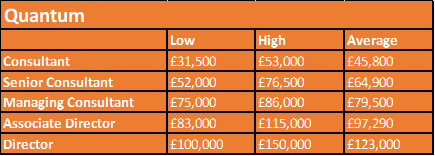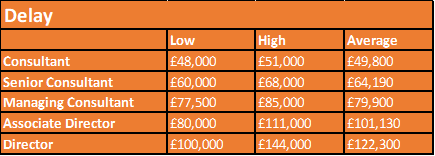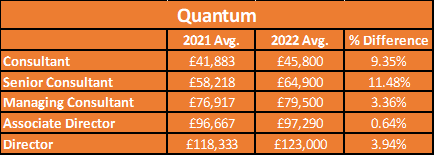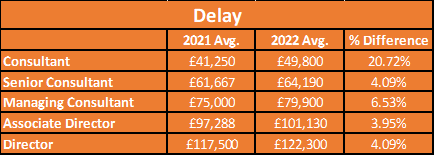2022 Annual Salary Guide for UK Construction Claims and Disputes Jobs
Posted by Specialist Claims and Dispute Team, Maxim Recruitment on Thursday, April 21, 2022
In February 2021 I presented the findings of Maxim Recruitment’s very first annual salary benchmarking exercise for the UK construction claims and disputes market.
During 2021, this article gathered strong interest from clients and candidates alike within the industry. Over the last 12 months I have been working to collate and update the data and am now pleased to present the new 2022 data.
The figures provided below are based on Basic Salary and Car / Travel Allowances provided as part of a package and excludes any other benefits such as bonuses (whether guaranteed or discretionary), pension contributions and private healthcare offerings.
This information also relates purely to staff employed on a permanent PAYE basis and does not include freelance or contract staff remunerations or pay rates.
2022 Salary Guide for Construction Claims and Dispute Professionals in UK Permanent Employment:


A Guide to the Different Job Titles & Levels of Seniority:
Due to employers within this marketplace each having unique hierarchy structures, I feel it worth elaborating on the criteria I have used to assign salaries to each level of seniority.
Consultant:
Consultant level roles are true predominantly true entry level roles into construction disputes. Usually, candidates will need to have built up a minimum of circa 4 years’ experience in a traditional construction role such as a Quantity Surveyor, Planner, Project Manager or Engineer prior to moving into disputes.
It is rare to see this, however I have seen candidates who have managed to transition into a specialist Consultant role with as little as 1-2 years of experience. You may also see candidates with between 5 – 8 years experience offered a role at this level if they have had little to no experience dealing with claims and disputes in their traditional role.
Senior Consultant:
Senior Consultant is often assigned to candidates with circa 5 – 10 years of experience in a traditional construction role where they have worked for a contractor, professional quantity surveying practice or a client organisation rather than a specialist disputes consultancy previously.
Often candidates at this level will combined a good technical understanding of their traditional role as well as having amassed some experience in handling common disputes that arise on projects. This can either be in a managerial or supporting role.
Candidates with little to no experience managing disputes but a good theoretical knowledge may also be considered for Senior Consultant roles. Often their theoretical understanding is acquired by completing specialist qualifications such as an MSc/LLM in Construction Law which are highly desirable at this level.
Managing Consultant:
Typically, a Managing Consultant has worked in a specialist disputes orientated role for several years. Most commonly for a specialist consultancy.
However occasionally candidates will have amassed significant disputes experience within their traditional role as a Quantity Surveyor, Planner, Engineer or Project Manager for a contractor or client organisation. Where this is the case, they may be considered for a Managing Consultant role dependant on how the employer values their experience.
Such experience will usually be reinforced by the completion of a specialist higher qualification such as the MSc/LLM in Construction Law. Candidates at this level will often be comfortable acting in a leadership role on smaller and less complex disputes but will likely still be acting in a supporting role to experts on major, complex disputes.
Not all Consultancies have a ‘Managing Consultant’ role, and it is not uncommon for some employers to have multiple grades within Senior Consultant (or similar) before reaching Associate Director level.
Associate Director:
At Associate Director, candidates will have gained significant experience in managing complex disputes and often have experience of carrying out the expert witness role or lead assistant role to the expert witness.
They will have the skills to manage teams of consultants and complex dispute processes, whilst also taking some responsibility for business development duties. Often, they have a strong reputation with solicitors and law firms and be showing signs that they can generate work for the business in the near future.
They will likely be duel-qualified (technical degree and construction law qualification) and hold one or more professional memberships.
Director:
At Director level candidates will often acted as an expert witness on multiple occasions. They will have a strong network of legal professionals and generate work for a business through their reputation and connections. They will typically lead disputes, testify and be cross-examined as well as writing the expert report. They will have the ability to manage and mentor teams of consultants.
Increased Salaries From 2021 to 2022 (%)
Average Increase in annual salaries:
I have compiled some tables below showing the average salaries for 2021 and 2022 and the percentage increase for each discipline (Quantum and Delay) and for each level of seniority.


Personal Insight into changes from 2021 to 2022:
The first thing you will notice is that salaries at all levels for both disciplines, have increased.
The slightly surprising trend is that salaries at the lower levels have generally increased at a higher percentage than those at a senior level. In particular, a 20.72% increase in the average salaries for consultant level Delay Analysts, seems staggering. However, we see similarly high increases at Consultant and Senior Consultant for Quantum Consultants, albeit to a slightly lesser extent.
The reason I find this slightly puzzling, is because for the last 12 months I have seen a clear bias amongst employers within disputes to hire at Managing Consultant, Associate Director and Director level (i.e. the higher levels of seniority). Therefore, I suspected we may see much higher increases at these levels as clients pay higher salaries to entice candidates away from their roles with competitors. This appears to not be the case.
Whilst a couple of employers seem to have been paying above average salaries for candidates at these levels, many employers seem willing to pay fair salaries and rely other factors such as bonus schemes, progression opportunities and company culture & reputation to attract candidates at the higher levels.
As for why we are only seeing modest salary increases at Managing Consultant, Associate Director and Director level; my best guess is that candidates at such levels are often moving for opportunity rather than purely financial reasons. For example opportunity to lead more disputes is a common reason for an Associate Director level candidate to seek a new role.
There may also be a case for Associate Director and Director level roles seeing their annual earnings bumped up through lucrative bonus schemes linked to generating new business, which may not show up in these figures.
Finally, I suspect that the increase in salaries at the lower levels of seniority (i.e. Consultant and Senior Consultant) can be attributed to the high Quantity Surveying and Planning salaries in the wider construction industry currently. Candidates in such roles are often the targets for disputes consultancies looking to hire at Consultant or Senior Consultant level and there is certainly evidence that they have had to revise their salary bandings for these levels over the last year, to attract the best candidates into disputes roles.


